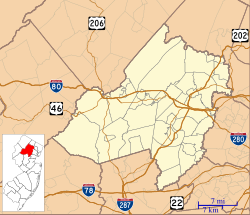Spring Brook House | |
 | |
| Location | 161 James Street Morristown, New Jersey |
|---|---|
| Coordinates | 40°46′56″N74°28′59″W / 40.78222°N 74.48306°W |
| Built | 1904–1906 |
| Architect | George A. Freeman; Francis George Hasselman |
| Architectural style | Colonial Revival, Georgian Revival |
| MPS | Morristown Multiple Resource Area |
| NRHP reference No. | 86003111 [1] |
| NJRHP No. | 2199 [2] |
| Significant dates | |
| Added to NRHP | November 13, 1986 |
| Designated NJRHP | September 11, 1986 |
The Spring Brook House is a historic brick building located at 161 James Street in the town of Morristown in Morris County, New Jersey. Part of the Morristown Multiple Resource Area (MRA), it was added to the National Register of Historic Places on November 13, 1986, for its significance in architecture and commerce. [3] The house is currently a retreat, the Loyola Jesuit Center in Morristown. [4]



